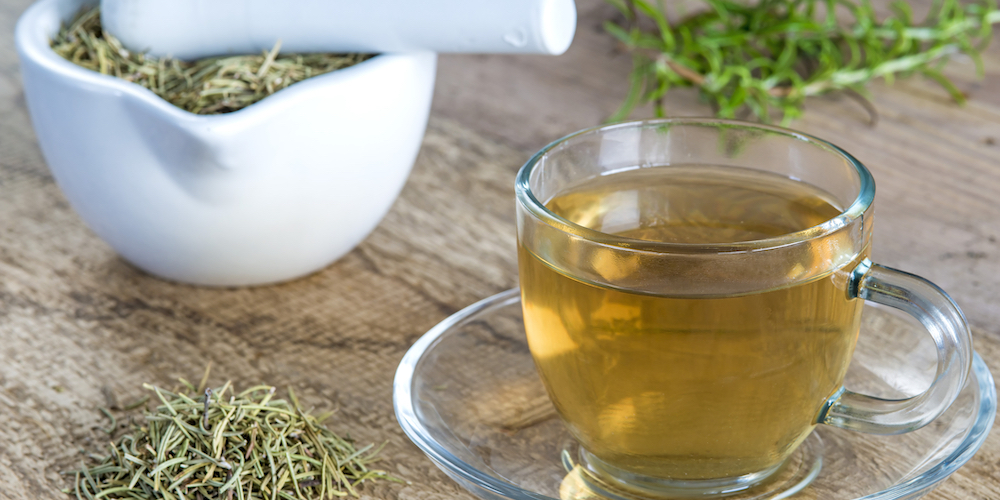8 Surprising Benefits of Rosemary Tea

Rosemary is a fragrant herb that has been used in traditional medicine for centuries. Recently, scientists have begun to study its potential health benefits. One of the most promising areas of research is rosemary tea benefits.
High in antioxidants and has anti-inflammatory and antibacterial properties. It can also help improve cognitive function and memory. In this article, we will explore eight of the most surprising benefits of rosemary tea!
Table of Contents
- Rosemary Nutritional Value
- Benefits of rosemary Tea
- 1. Rosemary Tea Benefits for Hair
- 2. Rosemary Tea Benefits for Skin
- 3. Rosemary Tea for Weight Loss
- 4. Does Rosemary Tea Help you Sleep
- 5. Rosemary Can Help Lower Blood Sugar
- 6. Rosemary Tea Benefits for Memory
- 7. Rosemary Can Aid Eye Health
- 8. Rosemary Tea for Digestion
- Rosemary Tea Side Effects
- Does Rosemary Tea Have Caffeine
- How to Make Rosemary Tea
- Conclusion

Rosemary Nutritional Value
Rosemary is rich in phytochemicals, which are not essential for survival like vitamins and minerals but still play an important role. These plant-based chemicals have been associated with fighting the disease as well as maintaining health overall.
Especially when it comes to your eyesight! It may help regulate liver function or lower the risk of asthma too so you can stay active all day long
Rosemary is not only a powerful antioxidant, but also contains many nutrients that support the body’s natural healing process. For example, it provides plenty of pantothenic acid and niacin to help regulate blood sugar levels as well as Thiamine which helps keep your nerves healthy!
Benefits of rosemary Tea
Herbal tea is becoming an increasingly popular choice for those looking for a healthier drink option. While there are many different varieties of herbal tea to choose from, rosemary tea leaves deserve special attention.
It has several surprising health benefits, which is why it’s worth considering adding it to your daily routine. Read on to learn more about the benefits of rosemary tea and how you can start enjoying them today!

1. Rosemary Tea Benefits for Hair
Rosemary tea can be beneficial for your hair in several ways. For one, it can help stimulate hair growth. The nutrients in it can also help to strengthen your hair and prevent breakage. Rosemary tea can also improve blood circulation to the scalp, which can promote healthy hair growth.
Rosemary is a herb often used to stimulate hair growth. In one study, it was found that when mice suffering from lower levels of testosterone in their system were increased it can help them grow back more hair than before!
This could indicate how this would work with humans too but we’re still waiting on verification studies before giving our opinion
2. Rosemary Tea Benefits for Skin
Drinking rosemary tea can also do wonders for your skin. The antioxidants in rosemary herb tea can help to protect your skin from damage caused by free radicals.
Free radicals are unstable molecules that can cause oxidative stress, which leads to premature ageing of the skin. It can also help to reduce inflammation and redness on the skin.
Rosemary is an excellent addition to your acne treatment regime. Not only does it have antibacterial properties, but rosemary also helps decrease redness and puffiness in those pesky cystic breakouts!

3. Rosemary Tea for Weight Loss
Rosemary tea can also help with weight loss. The polyphenols in rosemary tea can help to boost metabolism and promote fat burning. This Herb can also help to suppress appetite, making it easier to stick to a healthy diet.
A cup of rosemary tea before meals may help you eat less and control your portions better throughout the day! This is perfect for anyone who’s trying to manage their weight healthier way. Adding this little habit into your routine could make a big difference over time.
4. Does Rosemary Tea Help you Sleep
Rosemary tea can also promote better sleep. The plant compounds in rosemary herbal tea can help to relax the mind and body, making it easier to fall asleep. Rosemary tea can also help to reduce stress levels, which can also lead to improved sleep quality.
If you’re someone who struggles with insomnia, drinking a cup of rosemary herbal tea before bed could be a natural and effective way to improve your sleep quality.
The benefits of rosemary are not just limited to its nutritional value. One study found that taking 500 mg twice daily for 1 month significantly lowered anxiety levels and sleep quality among college students!

5. Rosemary Can Help Lower Blood Sugar
Rosemary tea can also help to regulate blood sugar levels. The plant compounds in rosemary can help to slow down the absorption of sugar in the gut. This can help to prevent spikes in blood sugar levels after meals. Rosemary tea can also help to increase insulin sensitivity, which can also help to regulate blood sugar levels.
If you’re someone who struggles with managing their blood sugar levels, drinking rosemary tea could be a helpful addition to your routine.
A study of rats found that rosemary leaf extract was able to significantly lower their post-meal glucose levels! More research is needed on this subject but it’s looking like rosemary could be promising for those with diabetes or prediabetes.
6. Rosemary Tea Benefits for Memory
One of the most surprising benefits of rosemary leaf tea is its ability to improve memory. The compounds in rosemary tea can help to improve blood circulation to the brain, which can in turn lead to improved cognitive function. Rosemary tea can also help to reduce
The study found that inhaling rosemary aroma improved concentration and performance while also increasing mood. participants’ activity level, blood pressure, heart rate or breathing increased after they had been exposed to the scent for 4-10 minutes before taking on a mental task like memorizing lists of words.

7. Rosemary Can Aid Eye Health
Rosemary tea can also help to improve eye health. The antioxidants in rosemary tea can help to protect the eyes from damage caused by free radicals. Rosemary tea can also help to reduce inflammation and redness in the eyes.
Rosemary is a well-known herb for its health benefits, but did you know that it can also help prevent cataracts? There is a study showing how this small plant delays the onset of these vision problems and reduces their severity.
However, unlike pure extracts which provide us with little insight into what effect drinking rosemary tea may have on our eyesight, I would recommend consulting an expert before making any decisions regarding intake amount or frequency.
8. Rosemary Tea for Digestion
If you’re someone who struggles with digestive issues, drinking rosemary tea could be a helpful addition to your routine. The bitter compounds in rosemary leaf tea can help to stimulate the production of digestive juices, which can in turn help to improve digestion. Rosemary tea can also help to relieve gas and bloating.
A study of rats found that rosemary extract was able to significantly increase the production of digestive juices! More research is needed on this subject but it’s looking like rosemary could be promising for those with digestion issues.

Rosemary Tea Side Effects
While rosemary tea is generally safe for most people, there are a few potential side effects to be aware of. If you have high blood pressure, drink rosemary tea in moderation as it can cause your blood pressure to rise.
If you’re pregnant or breastfeeding, it’s best to avoid rosemary tea as there is not enough research on its safety during pregnancy or breastfeeding. Rosemary can also interfere with certain medications, so if you’re taking medication, it’s best to speak to your doctor before drinking rosemary tea.
Finally, if you have an allergy to plants in the mint family, you should avoid drinking rosemary tea as it could trigger an allergic reaction.
While rosemary tea offers many potential benefits, it’s important to be aware of the potential side effects. If you have any concerns, it’s best to speak to your doctor before drinking rosemary tea.
Does Rosemary Tea Have Caffeine
Rosemary tea does not contain caffeine. This makes it a great choice for those who are looking to avoid caffeine or reduce their intake. Rosemary tea is also a good choice for those who are pregnant or breastfeeding, as there is no risk of caffeine consumption.

How to Make Rosemary Tea
To make rosemary tea, start by boiling water and adding fresh or dried rosemary. Steep for 5-10 minutes, then strain and enjoy.
You can also add honey to tea or lemon to your rosemary tea if you like. If you’re using fresh rosemary, make sure to remove the leaves before drinking as they can be bitter.
Rosemary tea is a great way to enjoy the benefits of rosemary. It’s easy to make and can be enjoyed hot or cold. Try adding honey or lemon to your rosemary tea for a delicious and refreshing drink.
Conclusion
Rosemary tea is a delicious and healthy drink that offers a variety of benefits. Rosemary tea can help to improve memory, reduce stress, boost eye health, and aid digestion.
It’s also safe for most people, although there are a few potential side effects to be aware of. If you’re looking for a healthy and delicious way to enjoy the benefits of rosemary, try making rosemary tea.

 Loose Leaf Tea
Loose Leaf Tea Pyramids
Pyramids Tea Bags
Tea Bags Africa
Africa Assam
Assam Ceylon
Ceylon Chinese
Chinese Darjeeling
Darjeeling European
European Indian
Indian Japan
Japan Nepal
Nepal South East Asia
South East Asia Ayurveda Tea
Ayurveda Tea Black Tea
Black Tea Chai Tea
Chai Tea Flowering Tea
Flowering Tea Fruit Tisanes
Fruit Tisanes Green Tea
Green Tea Herbal Tea
Herbal Tea Matcha Tea
Matcha Tea Oolong Tea
Oolong Tea Organic Tea
Organic Tea Pu erh Tea
Pu erh Tea Rooibos Tea
Rooibos Tea White Tea
White Tea Asian Coffee
Asian Coffee Caribbean Coffee
Caribbean Coffee Central American Coffee
Central American Coffee South American Coffee
South American Coffee Coffee Blends
Coffee Blends Decaffeinated Coffee
Decaffeinated Coffee Espresso Coffee
Espresso Coffee Ethically Sourced Coffee
Ethically Sourced Coffee Flavoured Coffee
Flavoured Coffee Organic Coffee
Organic Coffee Single Origin Coffee
Single Origin Coffee Chocolate 1
Chocolate 1 Chocolate 2
Chocolate 2 Chocolate 3
Chocolate 3 Chocolate 4
Chocolate 4 Chocolate 5
Chocolate 5 Chocolate 6
Chocolate 6 Chocolate 7
Chocolate 7 Chocolate 8
Chocolate 8 Chocolate 9
Chocolate 9 Loose Tea Filters
Loose Tea Filters Tea Accessories
Tea Accessories Tea Bricks
Tea Bricks Tea Caddies
Tea Caddies Tea Caddy Spoons
Tea Caddy Spoons Tea Gift Ideas
Tea Gift Ideas Tea Infusers
Tea Infusers Tea Strainers
Tea Strainers